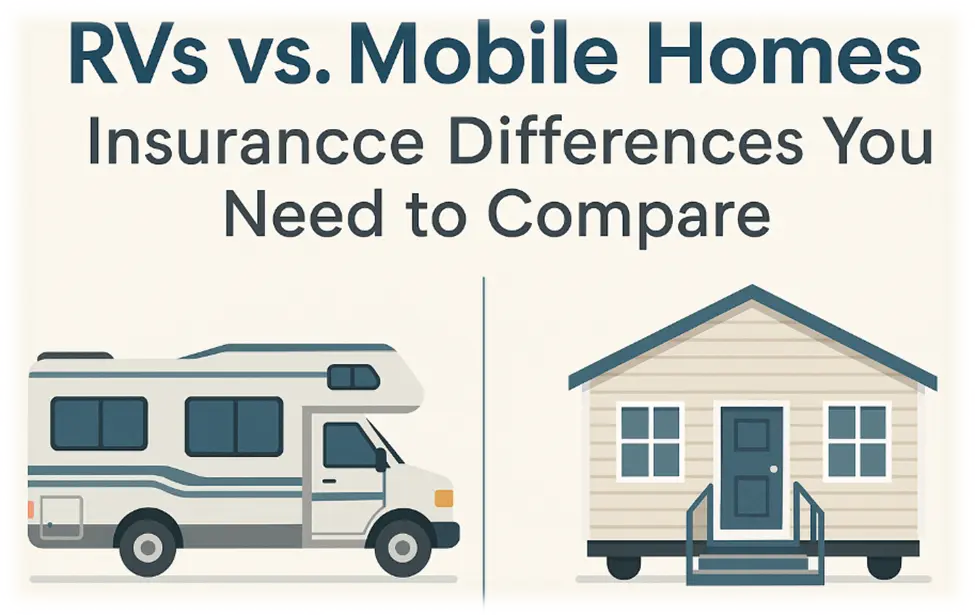Choosing between an RV and a mobile home can be confusing, especially regarding insurance. Mobile home insurance works differently from auto insurance claims for RVs. This guide will show the key differences, so you know what coverage fits your needs best.
Keep reading to make a smart choice before you buy or insure your next home-on-wheels!
Key Differences Between RV Insurance and Mobile Home Insurance
RVs and mobile homes need different types of insurance. RV insurance covers travel risks, while mobile home insurance focuses on stationary living.
Coverage for mobility vs. stationary use
RV insurance includes protection for both driving and parking. It acts like auto insurance since RVs travel on roads. Policies cover accidents, injuries, theft, and damage while moving or parked at a campsite.
Mobile home insurance works more like homeowners coverage. Mobile homes stay in one place after installation. This insurance focuses on damage from storms, fire, vandalism, or other risks to the structure where it sits permanently.
RVs need special coverage because owners use them as both vehicles and living spaces, says the Insurance Information Institute.
The type of policy depends on whether your home moves or stays put. Each covers unique hazards that fit its use.
Types of risks covered
RV insurance protects your vehicle both on the road and at a campsite. It often includes collision, liability, theft, fire, storms, and even damage from hitting animals. You get coverage for personal belongings inside too.
Some plans offer total loss replacement if your RV gets destroyed in an accident.
Mobile home insurance covers risks while your home stays in one place. It helps with losses from fire, windstorms, hail, theft, vandalism, and some types of water damage like burst pipes.
Most plans also pay for other structures on your land such as sheds or decks. Liability protection handles injuries to guests. Special endorsements may be added for valuable items or extra living expenses if you must leave during repairs.
Cost Comparison of RV and Mobile Home Insurance
RV insurance and mobile home insurance have different costs. Many factors affect how much you will pay, like the type of vehicle or home you have and where you live.
Factors affecting premiums
Insurance costs can vary widely between RVs and mobile homes. This difference is due to several factors.
- The value of the vehicle or home plays a big role in determining insurance premiums. More expensive RVs or mobile homes will generally have higher insurance costs.
- Age and condition of the vehicle or home also matter. Newer models might cost more to insure because their replacement value is higher. However, well-maintained older models can have lower premiums.
- Location is a key factor too. Areas with high crime rates or severe weather conditions often see higher insurance rates.
- The intended use affects premiums significantly. RVs used for full-time living will have different insurance costs compared to those used occasionally for vacations.
- Driver history and claims history are important for RV insurance. Those with clean driving records usually pay less.
- For mobile homes, foundation type can influence premiums. Homes secured on permanent foundations may receive lower rates than those without.
- Security features and safety measures can lead to deductions in premiums. Devices like burglar alarms and smoke detectors make vehicles and homes safer, potentially lowering insurance costs.
- Coverage options chosen by the owner impact the final premium rate. Choosing higher deductibles can lower monthly payments but increase out-of-pocket costs after an incident.
These factors collectively determine how much you’ll pay for either RV or mobile home insurance, highlighting the importance of comparing options carefully based on your specific needs and circumstances.
Choosing the Right Insurance for Your Needs
4. Choosing the Right Insurance for Your Needs: Think about how you use your RV or mobile home and what fits your lifestyle best. Read on to find out more!
Evaluating usage and lifestyle
Your usage of an RV or mobile home impacts your insurance choices. An RV is built for travel. If you move often, you need specific coverage for that mobility. Insurance might cover road risks and accidents.
A mobile home stays in one place most of the time. This means it needs different protection against theft, fire, or storms. Your lifestyle plays a big role in which type of insurance fits best.
Think about how much you travel and where you park your home on wheels.
Conclusion
RVs and mobile homes each have unique insurance needs. Know the differences to protect your investment. Think about how you use these vehicles and what risks you face. Choose the right coverage that fits your lifestyle.
Make informed choices for peace of mind while enjoying life on the road or at home.
Also Read-Why Tech-Savvy Designers Are Turning to Virtual Tools for Better Results








